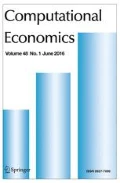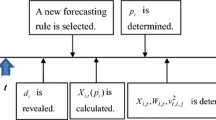Abstract
The proposition that a relatively new technology such as a differential evolutionary algorithm (DEA) can violate the weak form of the efficient market hypothesis is tested using daily data from the Australian share market from 2000 until 2008. An option trading strategy based on forecasts from a DEA is shown to perform better than a buy and hold strategy over parts of the sample space and, on average, over all of it. Speculators may make supernormal profits using new methodologies however such profits are unlikely to be sustained.
Similar content being viewed by others
References
Bachelier L. (1900) Theorie de la speculation. In: Cootner R. (ed.) English in Paul 1964. The random character of stock market prices. MIT, Cambridge, MA
Backus, D., Foresi, S., Li, K., & Wu, L. (1997). Accounting for biases in Black-Scholes, CRIF Working Paper series, paper 30. http://fordham.bepress.com/crif_working_papers/30. Accessed 18 Jan 2012.
Cox J. C., Rubenstein M. (1985) Option markets. Prentice Hall, Edgewood Cliffs, NJ
de Bondt W. F. M., Thaler R. (1985) Does the stock market overreact?. Journal of Finance 40: 793–805
Fama E. F. (1969) Efficient capital markets: A review of theory and empirical work. Journal of Finance 25: 383–417
Grossman S. J., Stiglitz J. E. (1980) On the impossibility of informationally efficient markets. American Economic Review 70: 393–408
Haugen R. A., Lakonishock J. (1988) The incredible january effect. Dow Jones-Irwin, Homewood, IL
Koutsiannis A. (1981) Theory of econometrics: An introductory exposition of econometric methods (2nd ed.). MacMillan, London
Malkiel B. G. (2003) The efficient market hypothesis and its critics. Journal of Economic Perspectives 17: 59–82
Roberts, H. V. (1967). Statistical versus clinical prediction of the stock market. Unpublished paper presented at the Seminar on the Analysis of Security Prices, University of Chicago.
Schiller R. J. (2000) Irrational exuberance. Princeton University Press, Princeton, NJ
Sharpe W. F. (1966) Mutual fund performance. Journal of Business 39: 119–138
Storn R., Price K. (1997) Differential evolution—a simple and efficient heurist for global optimization over continuous spaces. Journal of Global Optimisation 11: 241–359
Theil H. (1966) Applied economic forecasting. North Holland, Chicago
Author information
Authors and Affiliations
Corresponding author
Rights and permissions
About this article
Cite this article
Simmons, P.R. Using a Differential Evolutionary Algorithm to Test the Efficient Market Hypothesis. Comput Econ 40, 377–385 (2012). https://doi.org/10.1007/s10614-012-9314-2
Accepted:
Published:
Issue Date:
DOI: https://doi.org/10.1007/s10614-012-9314-2




